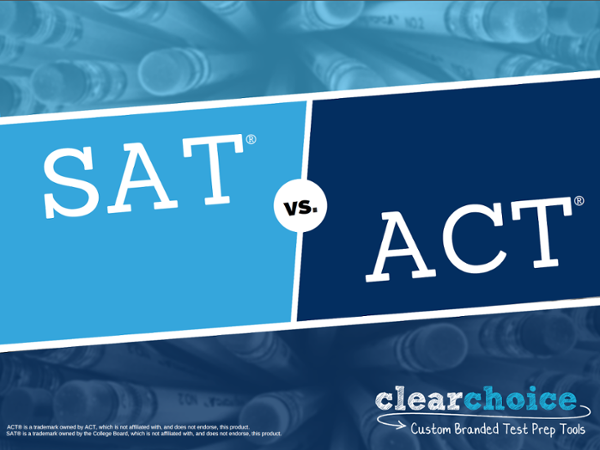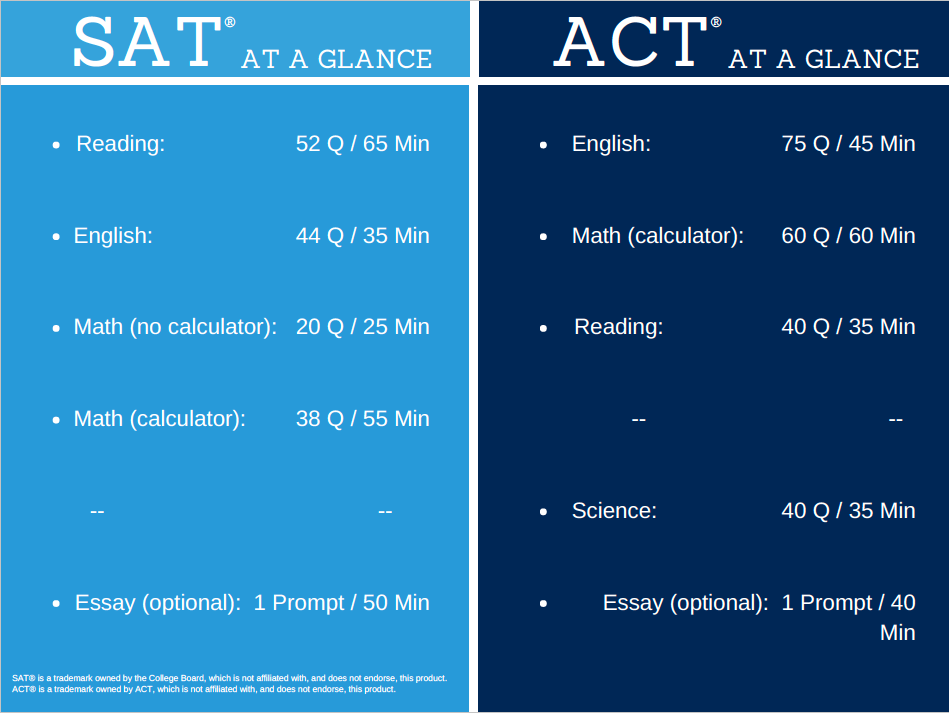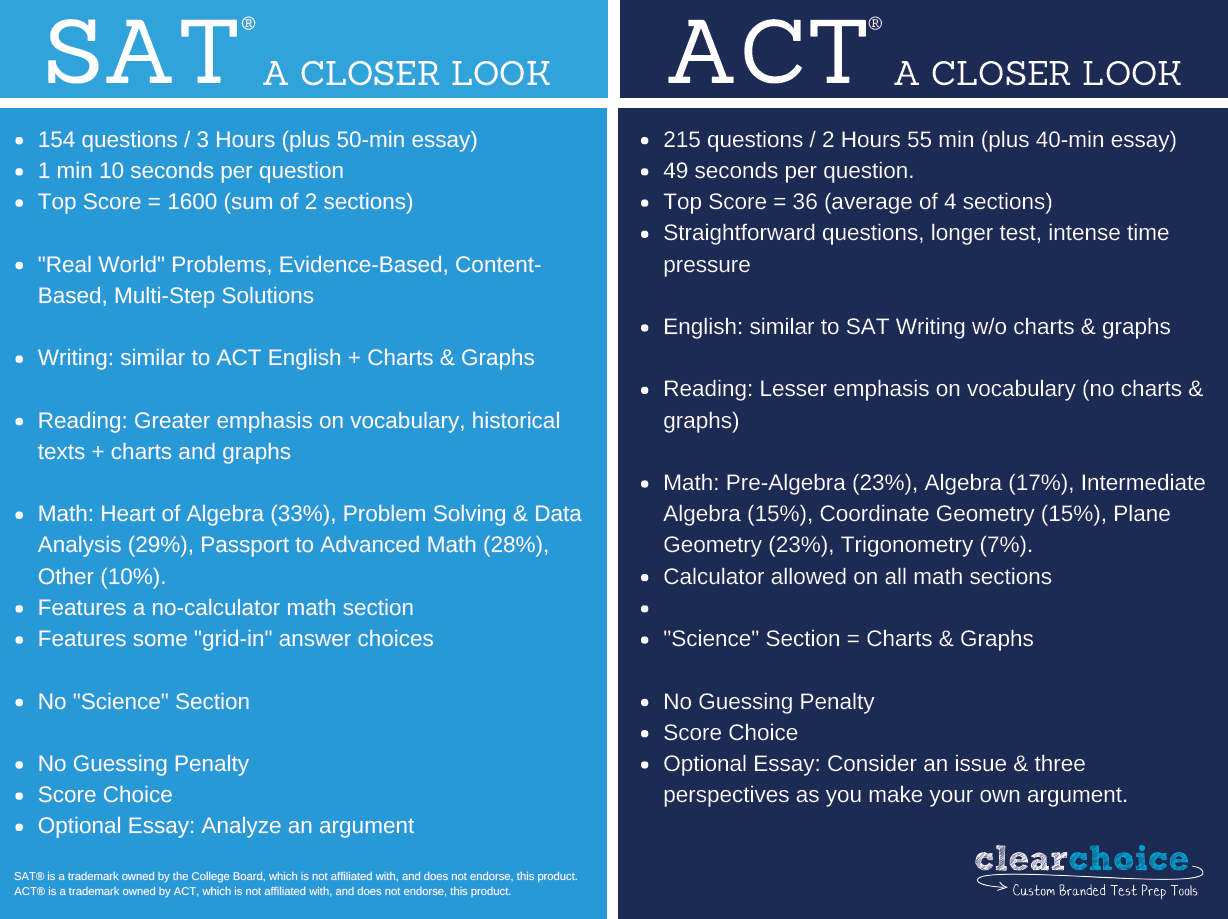SAT® or ACT®? Which Test Is Right For Your Student?
Updated on April 28, 2023
The SAT® and ACT® remain the big players in the college entrance exam game. More than 3 million students will take one (or both) of them as a part of the college application process. The question is, which one should your students take? We've put together a free Ebook to help you give your students the best possible advice.
While plenty of tutoring companies will try to offer “hybrid ACT®/SAT® diagnostic tests” that will magically steer customers towards the best test for them, the reality is that these tests don’t provide anything that self-reflection and a pair of practice tests can't do better. If you've been reading this blog, then you already knew that.
Now, we've put together a new resource for tutors that may contain some information you don't already know. Click the link below to download your free copy.
How Good Are Your Test-Taking Skills?
This may be the most important consideration when it comes to deciding between the ACT® and the SAT®. On the whole, the ACT® offers test takers significantly less time per problem than the SAT®. While there are some cases where the actual SAT® problems themselves may require more time to work through, ACT® takers regularly report feeling the crunch imposed by the tighter timing.
For students who are fast readers and can engage with and interpret questions quickly, the ACT® may give you an advantage.
Remember, both of these tests generate scores based upon comparisons with the rest of the test-taking pool. That means that your scores will be calculated, at least in part, in comparison to testers who may not have even been able to complete all of the problems.
On the other hand, if slow and steady sounds more like your approach to test taking, the SAT® may be a better fit.
How Good Are Your Computational Skills?
If your first instinct, when faced with a math problem, is to reach for your calculator, the ACT® has you covered. You can use a calculator on every math question on the test. As an added bonus, every question is multiple choice! These factors make the ACT® an appealing choice for those who are not as confident in their mathematical abilities. Some targeted test preparation can lead to substantial improvements.
The SAT® is a bit trickier in that there is a non-calculator section as well as several questions that expect test takers to grid-in responses (read: no lucky guesses). The trade-off is time; the SAT® offers more time for slightly fewer problems.
If your mental math skills are sharp and you feel comfortable with pencil and paper, the SAT® might be better suited to showcase your abilities. After all, you will be compared to other test takers who might fall victim to computation errors in the non-calculator section or get tripped up by minor mistakes in the open-ended, grid-in problems.
How Strong Are Your Analytical Skills?
One big difference (at least on paper) between the ACT® and the SAT® is the fact that the ACT® includes a Science section. Here’s the thing, it’s not really a test of your science knowledge, it’s a test of your analytical skills.
If you can extract information from nonfiction text and interpret data from charts and graphs, you are in good shape. If not, these are skills you can easily target for improvement with purposeful test prep.
The reality is, analytical skills are assessed on the SAT®, too. Rather than bundling these science-related skills into a dedicated science section, the SAT® embeds these problems into the Reading and Math sections of the test.
By opting for the SAT® over the ACT®, you aren’t avoiding science-related skills like data analysis and grappling with science-related, non-fiction texts. These concepts are just going to pop up over the course of the entire test, albeit in potentially smaller volumes.
How Strong Are Your Argumentative Skills?
While both the SAT® and ACT® offer optional writing sections, they focus on argumentative writing in two very distinct ways.
The SAT® asks test takers to read a passage and analyze the argument put forth by the author.
By contrast, the ACT® essay prompt presents multiple perspectives to an argument and asks test takers to choose and defend a position in the debate complete with their own analysis.
If analyzing text is a strong suit, stick with the SAT®. If you have a knack for taking a position and defending it, the ACT® essay offers you a better opportunity to let your argumentative side shine.
The Verdict
Over time, the SAT® and ACT® have evolved to become pretty similar in terms of content. Both evaluate similar mathematical and literacy skills in an effort to weigh student aptitude. There’s a reason why so many major colleges and universities will accept either test.
The Major Differences Between the SAT® & ACT®:
After considering these four questions you should have a general idea which test may be best suited to your strengths. That being said, the only way to know for sure which test is a better fit for you is to take each one for a spin. Thankfully, it isn’t a difficult proposition. Practice versions of both the SAT® and ACT® tests are available online. Set aside some time, simulate test-taking conditions (read: quiet environment, no phones, full tummy) and see how each test feels.
For test-prep professionals, you can help your students and potential clients with this important decision with 100% custom-branded test-prep materials that offer your students even more chances to select, practice, and prepare for the test that best fits their skills, whether it’s the ACT® or the SAT®.
In most cases, formally taking both the SAT® and the ACT® could wind up being an expensive mistake and a waste of your test-preparation efforts. The best bet is to put your energies (and your test fee dollars) behind the test that best suits your test-taking strengths.
Where do you stand on the SAT® vs. ACT® debate? For more posts like this one, be sure to subscribe to our blog. You can be sure that we will never send you anything that we don't think you'll find useful or enjoy reading.





